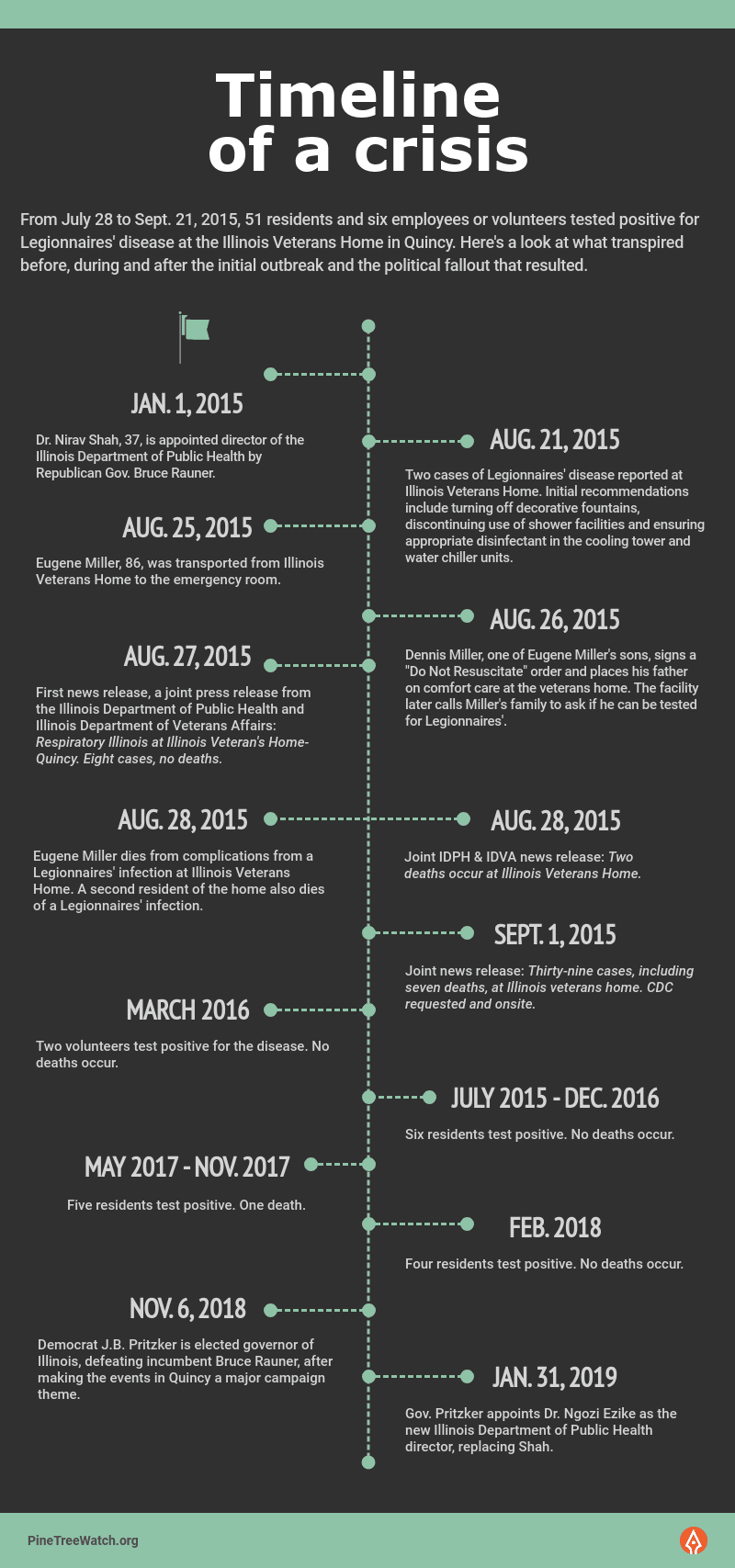State officials acknowledged Thursday that they knew about intense criticism, a grand jury investigation and calls for the ouster of Dr. Nirav Shah over his handling of a four-year deadly public health crisis in Illinois.
They hired him anyway.
They say the new head of Maine’s Center for Disease Control and Prevention acted appropriately and followed federal protocols while Illinois’ director of public health.

“Throughout our consideration of Dr. Shah, he has been forthright about his experience in Illinois — which includes successes in responding to the opioid crisis and improving the health of children — and his expertise will benefit Maine,” Maine Department of Health and Human Services Commissioner Jeanne Lambrew said in a statement issued Thursday.
And, in an email on Thursday night, Gov. Janet Mills had praise for Shah, who is a Henry Luce Scholar, worked for the Ministry of Health in Cambodia, and holds both law and medical degrees:
“The Department conducted an exhaustive, national search, and based on Dr. Shah’s credentials, I believe Commissioner Lambrew has selected a superbly qualified individual to lead the Maine CDC.”
In announcing his appointment on May 23, the DHHS lauded Shah’s record of reducing infant mortality and childhood lead-poisoning rates during his time in Illinois.
But recent findings by Pine Tree Watch paint his four-year tenure there in a far different light:
• Shah was severely criticized for his handling of repeated fatal outbreaks of Legionnaires’ disease — a form of pneumonia caused by a waterborne bacteria – at the state-run Illinois Veterans Home from 2015 to 2018. In all, 13 people died; 74 residents, volunteers and staff were sickened; and more were suspected of having contracted a non-fatal variation of the bacterial infection.
• The criticism started when Shah did not notify families or the public about the initial outbreak in 2015 for six days, despite suspecting an epidemic of Legionnaires’ was beginning at the veterans home. That outbreak sickened more than 56 people and contributed to the death of 12 veterans that year.
• The state of Illinois and the Illinois Department of Veterans’ Affairs are being sued by 12 families of the veterans who died from complications of Legionnaires’. None of the families has settled with the state.
• A grand jury in Illinois subpoenaed hundreds of records from Shah’s department related to its handling and response to the outbreaks.
Upon learning more about Shah’s time in Illinois, one Maine state representative said Friday that she isn’t happy with Lambrew’s decision to choose Shah.
“They gave us a really glowing report on all the wonderful things he’s done … but I have great concerns,” said Rep. Beth O’Connor (R-Berwick), a member of the Legislature’s Committee on Health and Human Services.
She called Shah’s appointment a “poor choice” in a list of what she called questionable appointments by Mills, and said she would not have hired Shah knowing of his management record in Illinois.
“I think we could find someone better,” O’Connor said, adding that she believes Shah should have been punished for his handling of the Legionnaires’ crisis, particularly for “deliberately” allowing residents of the veterans home to drink “swamp water, to put it in mild terms.”
“He (Shah) knew there was risk, but he let it go on anyway. Frankly, I wouldn’t hire him because of that,” O’Connor said.
Lambrew and Mills declined multiple requests to discuss Shah’s track record in his previous job and did not answer several questions put to them in writing this week.
Path to Maine began with early appointment in Illinois
When appointed at age 37 in 2015 by Republican Illinois Gov. Bruce Rauner, Shah described the director position as a “dream job” that arrived sooner than expected. “This is a political appointment, but it is not, for me, a political job. I’m a public health person and this is the job that I would feel lucky to have at the pinnacle of my career. So, imagine how it feels to get the call 30 years sooner,” Shah said in an interview with the University of Chicago, where he earned both his degrees.

But less than a year into his dream job, he became embroiled in political controversy over his decision to delay notifying families and the public about the initial outbreak of Legionnaires’.
Twelve veterans died from complications of the disease that year. And when new outbreaks occurred in three straight subsequent years – 2016, 2017 and 2018 – public outcry over the deaths of a total of 13 people and the sickening of 74 led state and federal lawmakers to order involved audits, approve emergency funding for plumbing and water-system repairs at the veterans home and conduct a day-long joint House-Senate Veterans’ Affairs Committee hearing in Chicago in January 2018.
The Illinois Legislature also voted last year to raise the cap on damages families could seek from the state for the deaths of relatives at the veterans home, from $100,000 to $2 million, retroactive to July 2015. Rauner vetoed the bill, but lawmakers overrode his decision in November 2018.
Lawmakers also tried to change the state’s bi-annual reporting laws for epidemics, suspected cases and confirmed cases of communicable diseases so that residents, families and the public would need to be notified within 24 hours of a lab-confirmed outbreak of Legionnaires’ disease in a veterans home.
Illinois lawmakers and U.S. Sens. Dick Durbin and Tammy Duckworth, both Illinois Democrats, repeatedly called for Shah to resign after a botched water-system repair at the veterans home came to light, information was withheld from the public, and the home wasn’t issued a safety violation citation.
But Shah stayed in his post until the final days of Rauner’s administration. Rauner lost his bid for re-election in November to Democratic challenger J.B. Pritzker, who made the Legionnaires’ outbreaks a campaign topic. Durbin and Duckworth spoke out about Shah right before election day last year. They called again for his resignation on Nov. 15.
Shah was scheduled to start as head of Maine’s CDC on Monday, but his arrival was delayed a week because of a family emergency. Shah could not be reached for comment on Friday.
The DHHS said in written responses to some but not all of Pine Tree Watch’s questions Thursday that it conducted a national search, considered “more than half a dozen applicants,” and conducted “multiple interviews with Dr. Shah and other candidates” before Lambrew offered Shah the job.
Pine Tree Watch asked DHHS officials if there was a search committee or headhunting firm involved in the process. The department didn’t answer the question directly, other than to say, “numerous people within and outside of DHHS were involved in the process.”
Gordon Smith, the state’s new Opioid Response Director, told Pine Tree Watch on Wednesday that he met with Shah during the hiring process. Smith said he knew of the Legionnaires’ controversy involving Shah.
“I think he’s the most qualified candidate,” Smith said. “He’s enormously well qualified, and I am looking forward to working with him.”
He referred further questions to Lambrew and DHHS spokeswoman Jackie Farwell.
Rebuilding a department
Mills inherited an understaffed Department of Health and Human Services when she took office in January, and the DHHS has been under heavy scrutiny following the 2018 death of 10-year-old Marissa Kennedy of Stockton Springs and the 2017 death of 4-year-old Kendall Chick of Wiscasset.
Mills’ first cabinet-level selection of Lambrew, a former Obama administration healthcare policy staffer, as commissioner of the DHHS in December set the tone for a renewed focus on health and healthcare in Maine. Mills said then that she hoped Lambrew would “reinvigorate morale” and “reorient the direction” of the department.
By the time Shah’s appointment was announced in May, DHHS had hired 18 new employees this year and was looking to fill an additional 40 positions, according to a department news release.
Sen. Geoff Gratwick (D-Penobscot), co-chair the state Legislature’s Committee on Health and Human Services and a retired physician, said Wednesday that Maine’s DHHS had been degraded by monetary cutbacks, staff turnover and the leadership for eight years of former Republican Gov. Paul LePage.
Gratwick said on Wednesday that he was pleased with the skills and leadership Shah could bring to the Maine Center for Disease Control and Prevention, which is overseen by Lambrew. He noted being impressed with Shah’s handling of a case of measles during his first week on the job in Illinois, which aligns with Maine’s recent debate on mandatory vaccination and the role Shah will have in Maine in controlling vaccine-preventable diseases.
However, when then asked what he knew about Shah’s role in the Legionnaires’ crisis in Illinois, Gratwick said he was unaware of that situation. He said he wanted to learn more before commenting further.
Gratwick met with Lambrew on Thursday morning, and told Pine Tree Watch afterward that the DHHS was aware of the Legionnaires’ outbreaks before hiring Shah. Gratwick shared a 2018 U.S. Centers for Disease Control and Prevention report that Lambrew’s office had access to while reviewing Shah’s application. The report outlines a CDC follow-up trip to the veterans home to investigate one of the Legionnaires’ outbreaks.
Lambrew cited federal CDC reports as evidence of Shah’s appropriate response to the Illinois outbreaks in her Thursday statement to Pine Tree Watch.
Gratwick said earlier Thursday that he plans to bring Shah in for a discussion with his committee, as he has done with sub-department heads hired at the Department of Health and Human Services since Mills took office. It’s typical for the committee to hear the perspectives and establish a working relationship with the directors, he said.
O’Connor said she would reserve judgment on recent hires within the DHHS who were brought in to speak with the committee and would try to do the same with Shah, but she thought several of Mills selections — including Lambrew — were worthy of more scrutiny.
The committee likely will have to call a special session to speak with Shah, though, because there won’t be time in its schedule before the end of the first regular session in two weeks, Gratwick said.
“We’re hiring someone here to take care of Maine health in the broadest possible way, and my background perspective is that we’ve done a terrible job in the last eight years,” Gratwick said.
Six critical days
Given the controversy and upset in Illinois, should Shah have been appointed to another high-level public health position?
The answer may center on a decision Shah made in August 2015 that he has publicly supported ever since.
The Illinois Veterans Home in Quincy, a 2½-hour drive up the Mississippi River from St. Louis, had two confirmed cases of Legionnaires’ disease on Aug. 21, 2015, and potentially more residents already exposed to the bacteria that can cause a fatal pneumonia in individuals over age 50. Shah and others, however, did not disclose the test results to the public for six days, despite realizing “the situation was the beginning of an epidemic,” Shah said in an Oct. 16, 2015 email to a state employee.
“That timing is in line with our typical reporting protocol,” Shah said in the same email uncovered by Chicago NPR affiliate WBEZ in 2017.
The 2015 decision for the Illinois Department of Public Health, Department of Veterans’ Affairs and governor’s office to stay quiet about the news of a possible Legionnaires’ epidemic left some families in the dark about their parents’ medical care.
That included Tim Miller, who found his 86-year-old father — a resident of the Illinois Veterans Home and Army veteran who served in Germany after World War II – dehydrated and curled in a fetal position in the Blessing Hospital Emergency Room on Aug. 25, 2015.
“The problem is, by the time they called us and told us something was going on, he was so far gone,” Tim Miller told Pine Tree Watch on Wednesday.
Twice, as his father laid unresponsive in a hospital bed, Miller called the veterans home to ask if any illnesses were being passed between residents. He said he was told no both times.
But, in fact, a state audit released this March showed that the Illinois Department of Public Health had visited the veterans home the day before to begin investigating a potential outbreak of Legionnaires’ disease.
As the state’s public health director, Shah was among the people to investigate what would become a string of deadly outbreaks over the next four years at the state home. These deaths are at the center of the 12 pending lawsuits against the state of Illinois.
In October 2018, a grand jury in Adams County, Ill., where the veterans home is located, also subpoenaed the Department of Public Health for records in an investigation into its handling of the Legionnaires’ outbreaks. The grand jury later also subpoenaed records from Gov. Rauner’s office and the Department of Veterans’ Affairs, which oversaw the operation of the home.
No indictment has been released. Shah has not been contacted about any ongoing investigations or lawsuits, according to the Maine DHHS written responses.
When asked what Maine’s protocol and timelines are for reporting diseases and outbreaks to the federal CDC, the DHHS, in written responses, would only say that “Maine CDC follows U.S CDC-recommended guidelines and protocols for disease reporting.
However, these decision are largely left up to the state, said Kristen Nordlund, a spokeswoman for the U.S. Centers for Disease Control and Prevention, in an email response to questions on Thursday.
“There is no specific timeline or guidelines for if and when a state should request assistance from CDC (this is across diseases); that is left up to the state to decide. CDC is only involved in outbreak investigations when a health department requests additional assistance,” Nordlund said.
What went awry?
A review of CDC reports, Illinois state audits, court filings and dozens of articles published by the Chicago Tribune, Chicago’s NPR station WBEZ, and the Associated Press with cross-references to original source material uncovered through the news outlets’ use of the Freedom of Information Act, Pine Tree Watch linked together a series of missteps related to Shah in Illinois.
Within two days of the Illinois Department of Public Health’s initial visit to the veterans home in Quincy and five days of the first two confirmed cases of Legionnaires’ disease, Shah’s team of public health officials was informed of the likely source of bacteria: a malfunctioning water tank.
The tank at the veterans home sat filled with stagnant water for more than 30 days before the system was turned back on. That stagnant water — which apparently never reached the necessary 140 degrees Fahrenheit required to kill most Legionella bacteria — released a “broth of Legionella” bacteria into the veteran home’s hot-water system, Shah wrote in an Aug. 29, 2015 email to a government spokesman.
Despite identifying the likely source of the bacteria, Shah declined to cite the facility for a violation.
“If we had wanted to cite them, we could have done so. It’s a standard, not a rule,” Shah wrote in the same email to the government spokesman.
Immediately upon learning of the faulty tank, however, the Illinois Department of Public Health directed the veterans home staff to make four changes:
- Isolate the broken tank from the hot water supply and empty it for swabbing
- Increase bromine (a disinfection alternative to chlorine) to 10 parts per million in the cooling tower and log it every four hours
- Stop the use of tap water for any resident care or services, and order bottled or packaged water for all potable use
- Discontinue the use of any water fixture where aerosols (such as water droplets or water vapor) are likely
Legionella cannot be passed from person to person by coughing or contact, but can be breathed in as water vapor. Fountains, spas, showers, tubs and dishwashers were therefore a risk and path for potential exposure.
The Illinois Department of Veterans’ Affairs – directed at the time by Erica Jeffries, another Rauner appointee in 2015 who resigned in May 2018 – reported to state auditors that it also held its first Legionnaires’ disease training on Aug. 26, 2015, the same day as the Illinois Department of Public Health’s second visit to the home. Annual training was held again in 2016, 2017 and 2018 as the outbreaks continued.
“Prior to training, staff were provided with little information on the disease, other than information discussing handwashing etiquette,” according to an Illinois state audit released in March 2019.
Help from the U.S. Centers for Disease Control and Prevention was eventually requested by Shah, and investigators arrived at the veterans home on Sept. 1, 2015 – 10 days after the first two cases of Legionnaires’ were confirmed and eight residents had died.
The federal agency offered a series of recommended changes to the water system in September 2015, including adding filters to every water fixture at the point-of-use by residents and staff until remediation of the water system was complete.
A state audit later found this recommendation was not fully implemented until after the final outbreak in 2018.
The Illinois Department of Public Health deflected responsibility for the continued outbreaks at the veterans home in subsequent years, saying it was responsible only for providing recommendations on how to identify people who were potentially exposed and how to implement remedial measures. The department did not operate the facilities or provide clinical care, according to the state audit.
Another problem: vaccine debt
A program that Shah’s office did have direct oversight of during his tenure became the subject of more criticism of his management style when it racked up a debt of an estimated $24 million to the federal government.
The debt accumulated over three years starting in 2014 – a year before Shah arrived – when the federal CDC told states they could no longer use free vaccine doses on children who qualified for the Children’s Health Insurance Program, known as CHIP, WBEZ reported.
A poor tracking system for use of the free vaccines, however, led to some CHIP-eligible children receiving doses of vaccines that the state had to pay for, and to stop the mounting debt from the error, the Rauner administration ordered Shah’s office in 2016 to stop providing free doses to doctors who served CHIP-eligible patients.
Doctors of CHIP-eligible kids would have to instead buy the vaccines upfront and go through a lengthy reimbursement process. Shah defended the decision, saying the repayment of existing debt was already taking away from other health programs, NPR reported.
DHHS too defended Shah’s management of the program that he had oversight of two of the three years the $24 million debt was accumulated.
“Dr. Shah fixed a billing problem that started years before he assumed the role, thereby putting an end to the accumulation of debt. During his tenure, he managed a budget and staff three times the size of Maine CDC,” the Maine DHHS said in written comments to Pine Tree Watch on Thursday.
Illinois transferred $3.5 million to the Illinois Public Health Association, a nonprofit, to manage the procurement of and payment for vaccines for CHIP-eligible children, but did not fully solve the problem. Shah’s replacement under Pritzker was still negotiating a repayment plan with the federal CDC last month.
Questions remain for victims’ families
As the five Miller siblings approach the four-year anniversary of their father’s death at the Illinois Veterans Home in Quincy, the youngest Tim, 48, still finds it hard that they’ll never know if they did enough on their father’s behalf.
Eugene Miller moved into the Illinois Veterans Home in Quincy in October 2012 after living with Tim and his family. His honorable discharge from the Army in 1947 made him eligible to live there and receive dementia care.
“It was a wonderful opportunity for him to have some community with some people who had some of the same life experiences he had,” his son said.
That opportunity turned into a nightmare for 13 families whose relatives died of complications of Legionnaires’ disease at the home. The fatality rate of Legionnaires’ was 32 percent among the residents who contracted the infection during the first outbreak in 2015. That’s above normal, according to CDC data that predict that one in four, or 25 percent, who get Legionnaires’ in a healthcare setting will die. Eugene Miller was among the first two people to die at the Illinois home.
Before Aug. 25, 2015, Eugene Miller could walk and eat on his own, but due to worsening dementia, could not hold a full conversation. Tim remembers Eugene had a video call to see his newest great-grandchild shortly before he became ill and was transported to the hospital in Quincy. That’s why it was a shock to find him unresponsive in a hospital bed on Aug. 25.
Tim and his next eldest brother Dennis agonized for the next four hours to find the best course of treatment for their dad, who had no clear source of infection, according to the medical advice and information they were receiving from the veterans home. They agreed comfort care at the veterans home was best, since Eugene had made it clear that he did not want to be on a ventilator at the end of his life.
“We were under the impression and belief there was nothing going on at the veterans home that could get him like this and this was the end of his life,” Tim Miller said.
It was only after Dennis signed a “Do Not Resuscitate” order for their father the next day that the Miller family heard the word “Legionnaires’” for the first time. The home called that day to ask if their father could be tested for the bacteria, Tim said.
The following day, the Illinois Department of Public Health and Department of Veterans’ Affairs released its first joint news release announcing the respiratory illness – nearly a week after it received positive test results of two Legionnaires’ cases. Eugene Miller died the following day.
“They were more concerned with not upsetting people than, ‘OK, people could die from this,’” Tim Miller said.
The Millers are among the 12 families suing the state of Illinois for conditions at the Illinois Veterans Home and wrongful deaths that resulted from Legionnaires’ bacteria being in the facility’s water system.
“People learn by mistakes, but I don’t want them to learn on Maine citizens,” Gratwick said on Wednesday as he read about Shah’s handling of the outbreaks in Illinois for the first time.







